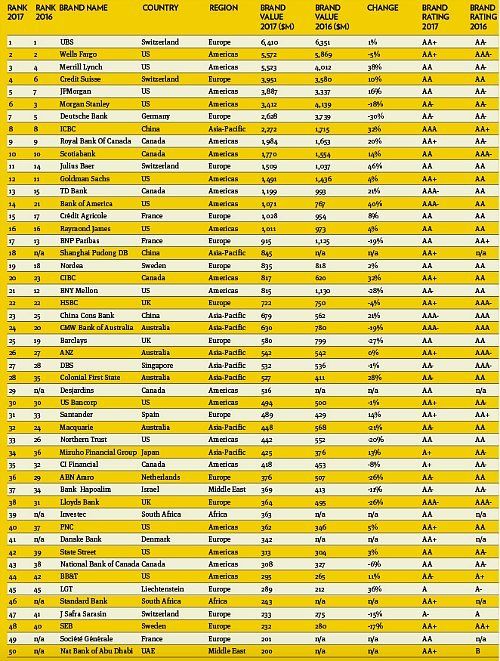Published by Finews.asia – 28th Aug 2017
Under the guidance of CEO Boris Collardi, Julius Baer has become a global player among wealth managers. The brand «Julius Baer» has acquired a most impressive prestige.
In global wealth management, the brand of a company has become key as banks compete for rich clients. For this reason, consultants on a yearly basis are figuring out how much the brand names are worth and by how much their values have changed.
Brand Finance is one of those companies: the London-based brand expert has published a global ranking of wealth managers, with the obvious winner being UBS. As last year, the Swiss No. 1 beat U.S. rivals Wells Fargo and Merrill Lynch, who took second and third places. The brand name «UBS» is worth $6.4 billion, almost unchanged from a year ago.

And Swiss banking has reason to be satisfied about the ranking by the U.K. experts: not only is the winner a Swiss company, but the country’s No. 2, Credit Suisse, moved up from 6th to 4th place, with its brand name worth $3.95 billion, up 16 percent from a year earlier.
Julius Baer, the Global Brand
And what’s more, Zurich-based Julius Baer is the bank with the steepest increase: the bank moved from 14th to 11th place, a most respectable position. The value of the brand increased by a whopping 46 percent to $1.5 billion.
With this increase, Julius Baer is the bank with the biggest appreciation of its brand among the world’s wealth managers. It is now better known than Goldman Sachs, Bank of America or HSBC as a player in the asset management industry.
Winners and Losers
Further down the list, LGT is another big-time winner. The brand of the private bank based in Liechtenstein gained 36 percent and is today worth $289 million. Most of this increase presumably was due to the bank’s recognition rate in Asia after it acquired the regional business of ABN Amro Private Banking.
The main impetus to wealth management and its brand names surely came through the good investment performance, pushing assets under management up. A decline in value normally was associated with events such as the damage to the reputation as in the cases of Wells Fargo and Deutsche Bank, both of which suffered a loss of value.




